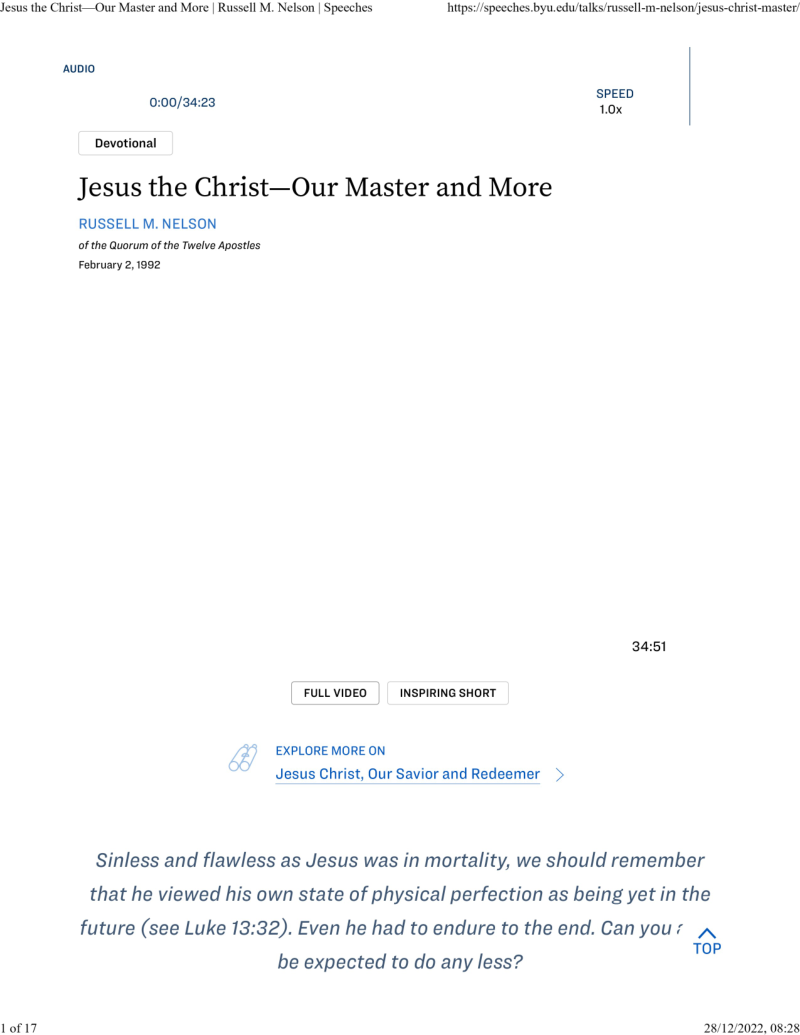Russell M. Nelson teaches that Jesus created under the direction of God the Father; atoned for the Fall of Adam.
- Type
- Speech / Court Transcript
- Hearsay
- Direct
- Reference
Russell M. Nelson, "Jesus the Christ—Our Master and More," BYU Speeches, February 2, 1992, accessed December 28, 2022
- Scribe/Publisher
- BYU Speeches
- Audience
- Members of The Church of Jesus Christ of Latter-day Saints
- Transcription
Savior and Redeemer
Jesus was born to be Savior and Redeemer of all mankind (see Isaiah 49:26; 1 Nephi 10:5). He was the Lamb of God (see 1 Nephi 10:10), who offered himself without spot or blemish (see 1 Peter 1:19) as a sacrifice for the sins of the world (see John 1:29). Later, as the resurrected Lord, he related that sacred responsibility to the meaning of the gospel, which he described in one powerful passage:
Behold I have given unto you my gospel, and this is the gospel which I have given unto you—that I came into the world to do the will of my Father, because my Father sent me.
And my Father sent me that I might be lifted up upon the cross. [3 Nephi 27:13–14]
Thus Jesus personally defined the gospel. This term comes from the Old English godspell, which literally means “good news.”
The good news is that Jesus Christ has made a perfect atonement for mankind that will redeem all mankind from the grave and reward each individual according to his/her works. This atonement was begun by his appointment in the premortal world but was worked out by Jesus during his mortal sojourn.[Bible Dictionary, s.v. “Gospels,” p. 682]
His atonement had been foretold long before Jesus was born in Bethlehem. Prophets had so prophesied his advent for many generations. Since this year’s Book of Mormon Symposium’s spotlight is focused on the book of Helaman, let us sample from its record, written some thirty years before the Savior’s birth:
Remember that there is no other way nor means whereby man can be saved, only through the atoning blood of Jesus Christ, who shall come; yea, remember that he cometh to redeem the world. [Helaman 5:9]
His atonement blesses each of us in a very personal way. Listen carefully to this explanation from Jesus:
For behold, I, God, have suffered these things for all, that they might not suffer if they would repent;
But if they would not repent they must suffer even as I;
Which suffering caused myself, even God, the greatest of all, to tremble because of pain, and to bleed at every pore, and to suffer both body and spirit—and would that I might not drink the bitter cup, and shrink—
Nevertheless, glory be to the Father, and I partook and finished my preparations unto the children of men. [D&C 19:16–19]
Jesus fulfilled his glorious promise made in pre–earthly councils by atoning for the fall of Adam and Eve unconditionally and for our sins upon the condition of our repentance.
His responsibility as Savior and Redeemer was indelibly intertwined with his responsibility as Creator. To shed additional insight on this relationship, I would like to share a remarkable quotation that I found in a rare book in London one day while searching through the library of the British Museum. It was published as a twentieth-century English translation of an ancient Coptic text. It was written by Timothy, Patriarch of Alexandria, who died in A.D. 385. This record refers to the creation of Adam. Premortal Jesus is speaking of his Father:
He . . . made Adam according to Our image and likeness, and He left him lying for forty days and forty nights without putting breath into him. And He heaved sighs over him daily, saying, “If I put breath into this [man], he must suffer many pains.” And I said unto My Father, “Put breath into him; I will be an advocate for him.” And My Father said unto Me, “If I put breath into him, My beloved Son, Thou wilt be obliged to go down into the world, and to suffer many pains for him before Thou shalt have redeemed him, and made him to come back to his primal state.” And I said unto My Father, “Put breath into him; I will be his advocate, and I will go down into the world, and will fulfil Thy command.” [“Discourse on Abbaton by Timothy, Archbishop of Alexandria,” Coptic Martyrdoms Etc. in the Dialect of Upper Egypt, vol. 4 of Coptic Texts, edited, with English translations, by E. A. Wallis Budge (London: British Museum, 1914; New York: AMS Press, 1977), p. 482; brackets appear in printed text. For comparison with related scriptures see Moses 3:7; 6:8–9, 22, 29.]
Jesus’ responsibility as Advocate, Savior, and Redeemer was foredetermined in premortal realms and fulfilled by his atonement (see Job 19:25–26; Matthew 1:21). Your responsibility is to remember, to repent, and to be righteous.
- Citations in Mormonr Qnas
The B. H. Roberts Foundation is not owned by, operated by, or affiliated with the Church of Jesus Christ of Latter-day Saints.

